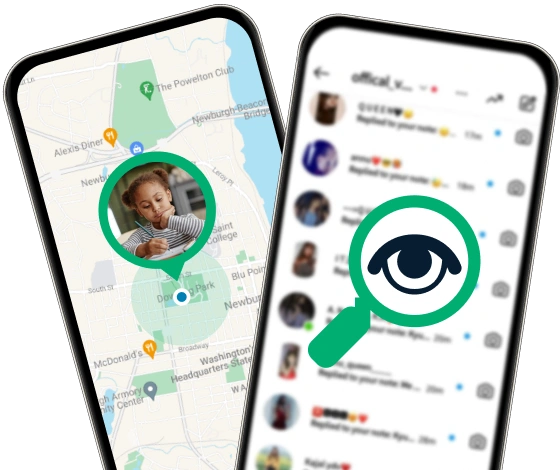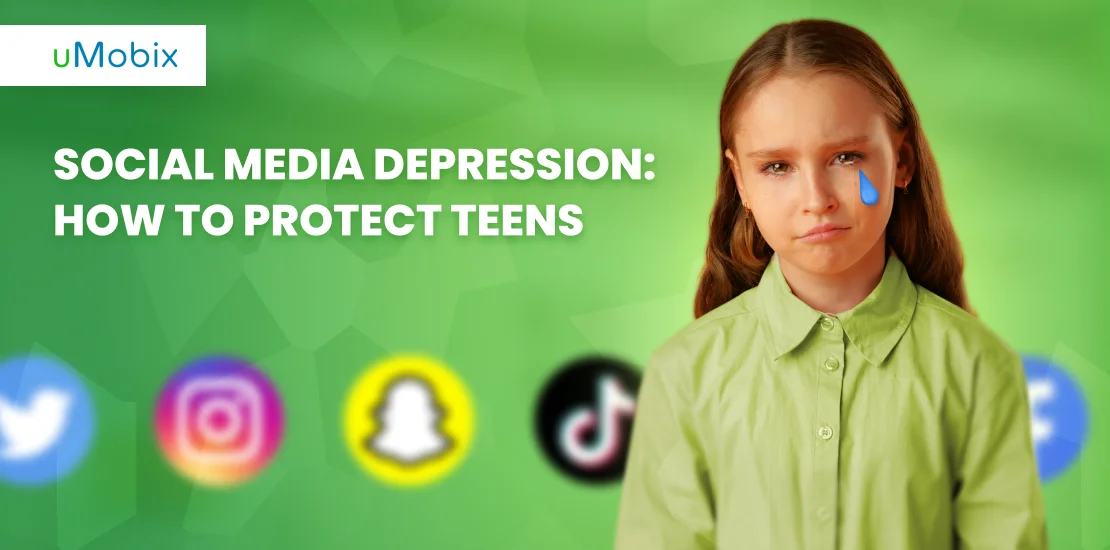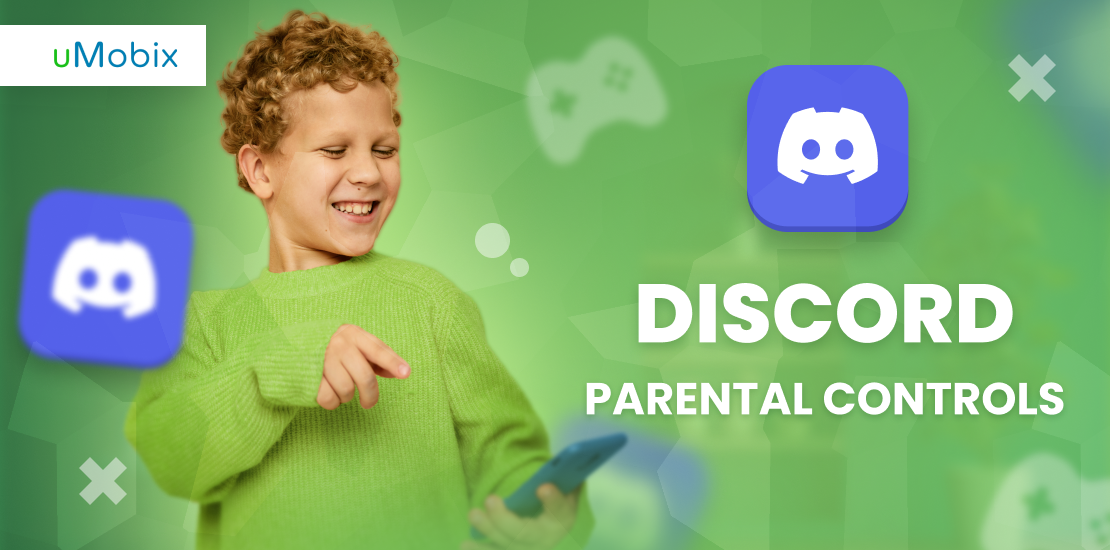Does social media cause depression? The latest social media and mental health statistics show that more than 5 billion people around the world use online networks. As such, it would be appropriate to say that social media deserves a high degree of attention and research from the medical community. After all, since many people use social media sites like Facebook daily and for several hours on end, social media and mental health are closely connected.
A research conducted by the Management School of MIT concluded that when Facebook was made more accessible to college students, the amount of the latter suffering from depression increased by 7% and from anxiety disorder – by 20%. The YHM survey has shown that according to the comments of young people, Instagram, Snapchat, Facebook, and Twitter make their feelings of anxiety worse, with YouTube being slightly on the positive side.
While big and important scientists still search for a way to make social networks safer and friendlier to their users, we want to share with you what we have been specializing in here at uMobix for half a decade – how to protect your children from all the dangers of such platforms today, in current conditions, and how to balance the social media and mental health.
Social Media and Mental Health Statistics
Since the first social media was created, scientists have been very interested in its effects on people and their emotional stances. In 2019, the Department of Experimental and Clinical Psychology of Ghent University, Belgium, and the Department of Psychology of Leiden University, Netherlands, published their social media and mental health statistics and concluded that the majority of Facebook users feel anxious and distressed if they cannot access the platform on a constant basis and that the effect and importance of social capital on their wellbeing on the platform is huge.
A 2021 study by the Department of Experimental Clinical and Health Psychology and the Department of Work, Organisation, and Society of Ghent University showed that excessive Instagram use has a huge effect on its users’ life satisfaction. The British Psychological Society claims that Twitter boosts feelings of boredom and loneliness, and the University of Toronto found out that this network also has a negative effect on people’s well-being.
With all that said, a logical question arises: Are social media platforms a disaster for humanity, and what can be done to minimize their negative effects? The answer for the first part is no, they are not a 100% disaster, and for the second – there are a lot of things that can be done. We will discuss both points in detail below.
Social Media and Mental Health: The Effects
Let’s now take a look at the effects social media has on mental health. Luckily, they are not only negative.
Positive Aspects of Social Media
There’s no denying that social media and mental health sometimes have positive dependencies, especially in the age of widespread digitalization, popularization of remote work, and globalization:
- people get the feeling of belonging to their social group and can follow all the events in their circle;
- people can stay in touch with their relatives and friends even if they live on the other side of the world;
- people get a chance to share their thoughts and opinions with the public and receive approval, which boosts their self-esteem;
- social media platforms give unlimited access to educational and informational resources posted by other users.
In other words, access to social media made many things that used to be hardly achievable accessible to people and created a huge bank of information of all types, modified and updated by millions of other users in real time. But how does social media cause depression?
Negative Aspects of Social Media
Apart from positive aspects, there’s no denying that there are some negative aspects of social media use:
- it often creates a hole between the people’s expectations and the reality;
- social networks are extremely addictive and cause people to waste tons of time scrolling their feeds or checking random posts;
- the system of likes on social media causes people to charge into a race for them, dedicating all their social media activity to getting even more “hearts” or “thumbs up”;
- such platforms often cause a lack of face-to-face interaction as it is much easier to chat with someone lying under a warm blanket on the sofa than getting up, dressing up, and going somewhere to meet someone in person.
Thus, social platforms only increase the gap between people’s expectations and reality and degrade social communication skills by substituting them with online, mostly text, communication.
Social Media and Teen Mental Health
Does social media cause depression? Despite all the pros and cons of social media on mental health, it’s one thing to talk about adults and their interactions with online networks. After all, adults are much better equipped mentally to note how they relate to online networks. They can monitor their reactions and understand that what they’re seeing may not be a complete reality. They can also keep track of how much time they spend on online networks.
However, social media and teen mental health have much more fragile connections. First, teenagers’ brains are not fully developed yet to the level of adults. Also, teenagers lack real-world experience that can help them see right from wrong and make the right decisions at the right time.
So, you can immediately see how online networks can have a profound influence on the developing teenage mind. A quick look around will show you that teens are obsessed with online networks. They use online networks like Facebook, Instagram, TikTok, Twitter, and others all the time. Below, there are some crucial ways in which social media and mental health are linked, including the development of social media depression.
Social Media Depression
Why does social media cause depression? Since many teens use online networks all the time (depending on the platform, the percentage of teens using it on a daily basis can vary from 80% to 51%, according to Pew Research Center), it follows that they seldom have the time or attention span to do anything of importance. They have no time to study, exercise, or read books—and, in extreme cases, even hang out with their friends.
Skewed Perception of Reality
What do we usually see on social media? Perfect lives of perfect people, trips, happy families, smiling parents, luxurious propositions, and expensive hotels. Needless to say, real life is not so bright and porch. Adults, unlike kids, usually have enough critical thinking to distinguish pictures on social media from reality. Teenagers, in their turn, often build their life expectations on what they see on social media. When they enter adult life – it is often painful for them as all their dreams about social media-like adulthood shatter like glass.
Lack of Sleep
People, especially teenagers, mostly surf social media from their mobile devices, and they do that often at night, lying in their beds or generally anywhere before going to sleep. According to the statistics provided by the American Academy of Sleep Medicine, 93% of young people surf TikTok until late at night; the picture with other social media is similar. Emotional overload, accompanied by the light from the screen that stops the sleep hormone melatonin from being produced, creates an explosive mixture of insomnia.
Perceived Social Isolation
If communication on social media goes so smoothly and fluently, why should people meet each other in real life and communicate face-to-face? This question leads to conscious social isolation and underdevelopment of social skills.
A research conducted by a team of scientists from different departments of Pittsburg University has shown that people who use social media are twice more likely to have PSI than those who don’t. It is especially dangerous for individuals who have problems with socialization before they register on social networks. They simply do not need now to develop their social skills and learn how to communicate with others. Sounds great until the moment such people find a job and join a team of co-workers; it is when the problems begin because they do not know how to communicate with others and solve arising problems.
Social Media Influences Self-Esteem
Social media and teen mental health are often closely connected to self-esteem. The ideal pictures of their peers and influencers of the same age make those who are not popular on social media think they are ugly, dumb, obese, dull, not deserving of popularity, etc. In this age, it is hard to explain to them that behind most of such ideal pictures on social media, there are stylists, plot writers, fitness coaches, psychologists, and a lot of other specialists working on creating such an image.
A study published in the Journal of Social and Clinical Psychology found that restricting social media use to just 30 minutes a day can greatly decrease feelings of depression and loneliness.
Disrupted Concentration
Teenagers nowadays are very proud of their ability to multitask. However, what they call “multitasking” is, in fact, disruption. This term is widely used by gamers who talk about doing a lot of things in a short period of time IN ONE GAME and playing several games at the same time.
Thus, when teenagers chat with their friends on Instagram, watch a video on YouTube, and do their homework, it is not multitasking – it is disruption. In such a situation, all the work is not done on time, teenagers get nervous and upset and start blaming the school, parents, teachers, whatever, for giving them such difficult tasks. However, they failed to finish it on time simply because of social media disruption.
Cyberbullying and Online Predators
Taking America as an example, a quarter of the teenage population of the country becomes victims of cyberbullying every month. Bullying, obviously, has always existed, but cyberbullying is simply another version.
Nowadays, with the help of social media, it is possible to bully anybody, anywhere, and anytime. Add to this online predators who hunt for nudes, explicit videos, or simply want to cheat other users for money: it is much easier for them to cheat on a teenager than on an adult person. Of course, in its essence, it is a problem of humanity, but anyway, social media gave such people a modern platform (pun intended) for their activity.
FOMO
Simply speaking, FOMO is an addiction to updates and one of the main links between social media and depression. People are so afraid of missing out on something that they may check their phones for updates every minute. Teenagers suffer from this even more because they can be waiting for a reply from a person they like or their friends, and not getting it immediately can make them feel forgotten and not needed.
Tips for Parents to Avoid Teens’ Social Media Depression

Let’s not take a look at what parents can do to help their children not become victims of social media depression.
Make Use of the Parental Control App uMobix
uMobix is a tool used by many parents to control what is happening in their children’s lives. One of its biggest advantages is that it is anonymous, meaning you will not disrupt your children when monitoring them. If your child has an iPhone – install uMobix on their device via iCloud remotely, and if they use a device with Android – install uMobix manually. After setting the social media tracker up, you can enjoy all its advantages:
- check how much time your child spends on different social media;
- review their friend lists and ban suspicious pages;
- go through the DMs and react quickly to cyberbullying or depressive thoughts they discuss in conversations with friends;
- check media files.
By using all these social media monitoring features connected to social media with GPS location tracking, e-mail monitoring, etc., you will get a full picture of what your child is up to and what you can do to help them as a parent.
Reduce Social Media Screen Time
How does social media cause depression? Many people nowadays start laughing when they hear “reduce screen time” because they feel that it is impossible, and screen time is already a part of our everyday life. They also do not see any connection between social media and depression. Well, of course, if you work at the screen, nothing can be done with that. But screentime “for fun” can definitely be reduced. A research by the University of Pennsylvania showed that a decrease of screen time to 30 minutes per day leads to better sleep and a reduction of anxiety and depression levels. However, it is easier said than done, which is why we prepared a couple of hints on how to do that.
- Many social media apps have time trackers which inform you about the time you spend on them. Do not hesitate to use these settings.
- Do not use your phone when you are in the gym, on the bus, at the playground with your kids, etc.
- Break the habit of staring at the screen before sleep. Better do not take your phone to the bed at all.
- Remove all the social media apps from your phone, and keep only those that are critical for you or your work.
- Disable notifications about messages and likes so that you do not need to check your device every 5 minutes when it beeps.
Add Social Media “Breaks”
It is a great idea to add so-called “breaks” – periods you spend without social media platforms at all. For instance, you can set Wednesdays as no-social-media days and not open them at all. If you go on a vacation with your children – set a rule not to use social media at all or use them only at certain times and for limited periods. Such breaks are essential if you want to spend more quality time with close people and receive brighter and stronger emotions, and you will not wonder anymore why does social media cause depression simply because you won’t have any.
Talk to Your Teen Regularly
Many parents ignore communicating with their children for many reasons: too much work, tiredness, lack of time, etc. So, it should not be surprising that kids often find a substitute—people who will listen to them and probably help with advice—online. No matter how you feel, remember that your child needs your attention and advice, and do not ignore them. Talking to them regularly will show them that you care, decrease their feelings of loneliness, and help them stick to social media platforms more consciously.
Teach Your Child Online Privacy
As adults, you know that it is dangerous to share your payment details, photos, personal data, etc., with strangers online, but how are your children supposed to know if you do not teach them about online privacy? It is your duty as a parent to explain all the essential points about privacy and teach kids what they should never do online, no matter how sweet and cool the person they are chatting with is.
Change Teens’ Focus
It is one thing to use social media to get useful information or contact a person you need, but it is another to access them just by scrolling through the feed mindlessly. The latter usually happens when people have free time, are bored, or do not know what to do. Focusing on important tasks, hobbies, or something that interests you helps to decrease screen time. It might be more difficult for children to change focus, so it is essential that their parents help them to switch their attention.
Set a Good Example
It is not a secret that children often copy what their parents do. Thus, if they see you staring at the screen all the time, what are the reasons for them to act differently? Try doing sports, focus on your hobbies, go out, and show your teens that there are a lot of other engaging activities. Set your own example and see what happens. You will be surprised.
Social Media Depression Signs: Checklist for Parents

After discussing the influence of social media and depression generally on people and particularly on teens and children, here is the list of signs you should pay attention to identify social media addiction before it is too late:
- your child does not want to go out and meet their friends face-to-face.
- your child checks their phone for notifications and messages from social media every now and then;
- your child feels depressed when they do not get access to their favourite platforms for a long time;
- your child feels anxious if they do not get replies from their friends immediately;
- your child ignores you and may not even hear what you are saying if they are looking in the screen at the moment.
If you notice any of this – it is high time to start acting and paying your children more attention and, maybe, turn to parental controls.
How to Overcome Social Media Depression as a Teen?
There are not so many things parents can do to help their teen overcome social media depression if it has already started, but there are some things that will definitely not make the situation worse.
- Show support. Even if your child resembles a hedgehog with spikes in all directions, show your support. Make them feel that you are near them and that they can always rely on you.
- Suggest professional help. Children often do not understand it or are simply too shy to ask for help, so you, as a parent, should suggest they go to a psychologist or find a professional online.
- Understand them. Do not argue with your child, and do not tell them that their depression is worthless and happens only because they have too much free time. Show them that you understand all the seriousness of their situation.
- Limit screen time: Use screen time management tools to limit the time spent on social media. Apps like Instagram and TikTok can consume hours without notice, so setting daily limits can help maintain a healthy balance.
- Develop Offline Connections. Help them prioritize face-to-face interactions over online communication. Real-life friendships provide more emotional support.
Final Thoughts on Social Media and Mental Health
Social media platforms are an important part of modern everyday life, and you cannot change anything about it. However, you may only use such platforms when it is needed for work or to urgently contact someone, and stop mindlessly consuming tons of content posted there.
As parents, it’s essential to keep an eye on your teen’s social media habits. Social media and depression are extremely dangerous for younger people. It is difficult for children and teens to control their screen time, so parents must participate in the process. Installing uMobix allows them to check how much time their kids spend on social media, while a personal, sincere conversation should build stronger bonds between parents and children and help the latter distance from their gadgets. Do not forget about your children, take care of them!
FAQ
There is no direct answer to this question, as there are many variables that need to be considered when answering. However, researchers claim the perfect amount of screen time is just one hour a day. So if you find that you or your close ones use social media for more than 2 hours every day, then it may be best to reconsider your relationship with online networks.
You will need to pay attention to determine these signs. They include withdrawing from any activities that your kids previously enjoyed, withdrawing from their social life, and doing not much else besides mindlessly scrolling their social media feeds.
Again, this question has no direct answer, as all online networks have their pitfalls, and they’re all potentially highly addictive. It’s the way that they’re used that’s important. This goes for every single social media site, be it Facebook, Instagram, Twitter, Snapchat, etc.

Latest posts
- 10 Best Apps for Parents to Monitor Social Media: 2026 Guide
- Complete List of Keywords to Block for Parental Control
- Does Telegram Notify Screenshots? Everything About Screenshot Detection
- How to Find Someone’s Deleted Instagram Posts: Complete Guide
- Family Tracking App by uMobix: Keep Loved Ones Safe




